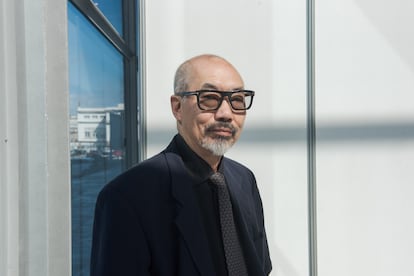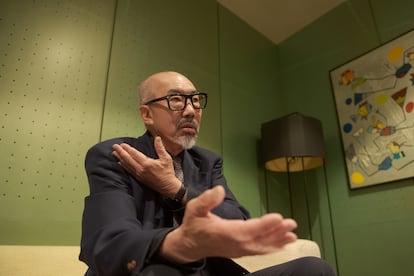Tak Mak, immunologist: ‘The immune system is the orchestra for most of life’s symphonies’
The Chinese-Canadian scientist, whose discoveries made immunotherapy possible, predicts that the relationship between the brain and the human body’s defenses will be the next major front in the scientific war against cancer


Tak Mak, 77, is responsible for two major discoveries — one theoretical and one technical — that made immunotherapy possible and turned it into a field that has revolutionized cancer treatment. Although he did not win the Nobel Prize for these momentous contributions — the award went to the scientists who put his discoveries into practice: James Allison and Tasuku Honjo —, he is a world-renowned figure in oncology and immunology research.
Mak defends the idea that scientists should be solitary thinkers, motivated only by discovering life’s questions, regardless of the awards or recognition that may come later. His latest work studies the relationship between the brain and the immune system, a field Mak hopes will open a new avenue in the fight against cancer. The veteran Chinese-Canadian researcher believes that this scientific war may be struggling to advance, and that is why he is focusing on looking for different solutions, as he told EL PAÍS in the Spanish city of A Coruña before his opening conference at the 46th congress of the Spanish Society of Biochemistry and Molecular Biology (SEBBM).
Question. Is immunotherapy the biggest recent advance in the war on cancer?
Answer. By far. Today, it is without a doubt the fourth pillar of cancer treatment. First came surgery, then radiotherapy and chemotherapy. But at the turn of the 20th to the 21st century, there were only 10 generic types of chemotherapy agents and no more have come out, the last one was approved in 2004. Then we moved to targeted chemotherapies, but that wellspring has also dried up. Now that the genes of more than half a million cancer patients worldwide have been sequenced, there are very few prominent new oncogenes left to target. So, in a way, we were stuck.
Q. How did your discoveries that led to immunotherapy address this problem?
A. Well, actually, our lab published in 1995 in the journal Science that the immune system has a brake, the CTLA-4 gene. If you remove that brake, the T cells continue to divide and grow uncontrollably. We blocked that gene in mice and saw that they died within two weeks and that 10% of their weight was T cells. However, it was James Allison — who’s one of my closest friends for 40 years — who discovered that if you block the CTLA-4 receptor with an antibody, you can cure certain types of cancer in mice. And finally, in 2010, researchers at Memorial Sloan Kettering in New York used an antibody against CTLA-4 in patients with advanced melanoma: they saw that 20% survived and looked like they were cured. That basically opened up the field of immunotherapy.
We must also not forget that Tasuku Honjo discovered another brake called PD-1. And that brake works even better. Instead of 20% of advanced melanomas, it cured 40%. Similarly, non-small cell lung cancer, kidney cancer and Hodgkin lymphoma have responded spectacularly to this immunotherapy. For these achievements, both Allison and Honjo received the Nobel Prize in 2018.
Q. In a recent interview, Spanish oncologist Joan Massagué — scientific director of the Sloan Kettering Institute — told EL PAÍS that thanks to these advances, metastasis is no longer a death sentence. Do you agree?
A. I think, for sure, there is an elongation of life because of immunotherapy treatments. And we can remember cases like that of [U.S.] president Jimmy Carter, who had melanoma metastases in the brain and received immunotherapy and is now cured [Carter will turn 100 on October 1]. I know Massagué well, but I cannot completely agree with his statement. We have made enough progress in certain cancers. For example, in Hodgkin’s lymphoma, it no longer matters if it is metastatic or not: it is cured. On the other hand, in non-small cell lung cancer metastases, from which everyone used to die, immunotherapy has now achieved that 5% live five or even 10 years with no relapse. So it’s not a yes-or-no answer.

Q. What do we need to do to stop metastasis with immunotherapy?
A. In the 2010s, it was thought that it was going to be fairly easy to combine anti-PD-1 with other drugs. But unfortunately, in the last dozen years, 2,000 clinical trials have failed. There have only been small successes in combining anti-CTLA-4 and anti-PD-1, but there is the problem of associated toxicity because by doing so we are provoking an unleashed response of the immune system, a kind of bursting. So, again, we are stuck.
What are the solutions? I think the key to avoiding these uncontrolled responses — which kill patients receiving immunotherapy — is to better understand how T cells work, which are the detectives of the immune system and are the ones that tell the antibodies, which are the policemen inside our body, which cells to arrest and which not to. And we have also encountered this underlying problem with Covid: why do some patients get very sick and die? Why are others asymptomatic? And it turns out that one in 200,000 lose all their hair. Why?
Q. Understanding of immunology is relatively new in the history of science. Are there still basic discoveries to be made in order to find the answers to the questions you raise?
A. I think that, in general, the foundations have already been laid. But a large part of the reason that this puzzle is still unsolved is due to the fact that T lymphocytes are very difficult to study. In the case of Covid, we have come to know that the T lymphocyte genes that you have inherited from your parents make the difference between whether you have a bad Covid or whether you are asymptomatic.
When I am asked what the fifth or sixth pillar of cancer treatment is going to be [after the latest breakthrough in immunotherapy], I really have no idea. But I think whatever it is, it will come from a continuation of our understanding of the immune system. Being Chinese, I will allow myself to quote Confucius here: “We have two lives, and the second begins when we realize we only have one.” And I, half-jokingly, as an immunologist, often say: “Medical researchers have two lives. The second begins when they realize that the immune system is the orchestra for most of life’s symphonies.”
Q. What do you mean by such a poetic statement?
A. On the one hand, immunology helps us better understand, of course, the fight against infections. Then there are transplants and autoimmune diseases. And now we have cancers that are either caused by the immune system itself, or are being treated by the immune system. I can also imagine that the immune system may be a component causing neurodegenerative diseases; and perhaps one day we will be able to turn that around and use it to treat these diseases, as we have done with cancer.
In fact, I think the connection between the immune system and the nervous system is going to be the next important discipline. Studying how these two very complex and very important systems communicate is going to be a big new field of research, I think, that is going to blossom in the next five to 10 years. Maybe I’m biased, because our lab is already at it: in 2019 we published a paper in Science showing that if you take away the ability of T cells to produce acetylcholine [a neurotransmitter], they lose their ability to completely kill a viral infection. And that’s genetic proof that our brain is talking to our immune system.
Q. If I were a young researcher, I would follow your advice and research that field. Because your discoveries, starting with the T-cell receptor in 1984, which was considered the Holy Grail of immunology, have laid the groundwork for immunotherapy. And the advances of others that made it a reality were awarded a Nobel Prize.
A. I am not allowed to compliment myself. And there is one thing I would like to say to those who come. We are not in science for the recognition, for the Nobel Prize. We are here for one reason only: to ask ourselves why. As an author called Simon Sinek says: “Everything should start with ‘Why’ and then ‘How?’ and finally ‘What?’. That is what we recommend in my group to our colleagues and our trainees.
And then there’s one more thing. I think scientists should be lonely. If you’re part of a crowd, you unnecessarily follow other people’s footsteps; and if you continue to following footsteps, you will never find new paths. I’m very much against crowds. I need to learn from my colleagues, students, technicians, whoever has ideas — I want to hear them. But then I need to retreat and use my own thinking and my bias to evaluate it so that I can come up with a new angle.
Q. Have you always been a questioner and lonely thinker, ever since you were a child?
A. No way, I don’t think so. In fact, I went to a Jesuit Catholic school in China, and my childhood desire was to become a priest.
Q. And how did that boy who wanted to be a priest end up being a scientist?
A. My parents emigrated first to the United States, and there I lost contact with the Catholic Church. Later, it was the need for money that led me to research. I had a job cleaning test tubes in a laboratory, but it was not very well paid. It was only a dollar an hour, and that money was not enough. When I finished and asked for more things to clean, the boss told me there was nothing more. But if I wanted, I could do experiments, which were better paid, and then I would have more material to clean. That is how I came to science, first as a hobby, and then it became my profession.
Sign up for our weekly newsletter to get more English-language news coverage from EL PAÍS USA Edition
Tu suscripción se está usando en otro dispositivo
¿Quieres añadir otro usuario a tu suscripción?
Si continúas leyendo en este dispositivo, no se podrá leer en el otro.
FlechaTu suscripción se está usando en otro dispositivo y solo puedes acceder a EL PAÍS desde un dispositivo a la vez.
Si quieres compartir tu cuenta, cambia tu suscripción a la modalidad Premium, así podrás añadir otro usuario. Cada uno accederá con su propia cuenta de email, lo que os permitirá personalizar vuestra experiencia en EL PAÍS.
¿Tienes una suscripción de empresa? Accede aquí para contratar más cuentas.
En el caso de no saber quién está usando tu cuenta, te recomendamos cambiar tu contraseña aquí.
Si decides continuar compartiendo tu cuenta, este mensaje se mostrará en tu dispositivo y en el de la otra persona que está usando tu cuenta de forma indefinida, afectando a tu experiencia de lectura. Puedes consultar aquí los términos y condiciones de la suscripción digital.








































